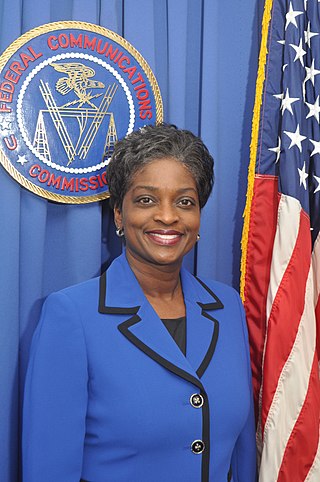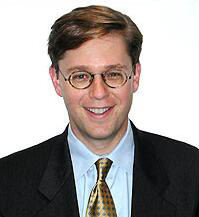
The Federal Communications Commission (FCC) is an independent agency of the United States government that regulates communications by radio, television, wire, satellite, and cable across the United States. The FCC maintains jurisdiction over the areas of broadband access, fair competition, radio frequency use, media responsibility, public safety, and homeland security.

The Communications Act of 1934 is a United States federal law signed by President Franklin D. Roosevelt on June 19, 1934, and codified as Chapter 5 of Title 47 of the United States Code, 47 U.S.C. § 151 et seq. The act replaced the Federal Radio Commission with the Federal Communications Commission (FCC). It also transferred regulation of interstate telephone services from the Interstate Commerce Commission to the FCC.

The National Commission on Terrorist Attacks Upon the United States, commonly known as the 9/11 Commission, was set up on November 27, 2002, to investigate all aspects of the September 11 attacks, the deadliest terrorist attack in world history. It was created by Congressional legislation, which charged it with preparing "a full and complete account of the circumstances surrounding the September 11 attacks", including preparedness by the U.S. federal government for the attacks, the response following the attacks, and steps that can be taken to guard against a future terrorist attack.

Michael Kevin Powell is an American attorney and lobbyist who served as the 24th chairman of the Federal Communications Commission from 2001 to 2005. Since leaving office, Powell has worked as the president of the National Cable & Telecommunications Association (NCTA), a broadband industry trade association.

Network neutrality, often referred to as net neutrality, is the principle that Internet service providers (ISPs) must treat all Internet communications equally, offering users and online content providers consistent transfer rates regardless of content, website, platform, application, type of equipment, source address, destination address, or method of communication. Net neutrality was advocated for in the 1990s by the presidential administration of Bill Clinton in the United States. Clinton signed of the Telecommunications Act of 1996, an amendment to the Communications Act of 1934. In 2025, an American court ruled that internet companies should not be regulated like utilities, which weakened net neutrality regulation.

A video relay service (VRS), also sometimes known as a video interpreting service (VIS), is a video telecommunication service that allows deaf, hard-of-hearing, and speech-impaired (D-HOH-SI) individuals to communicate over video telephones and similar technologies with hearing people in real-time, via a sign language interpreter.

Wiley Rein LLP, sometimes shortened to Wiley, is an American law firm based in Washington, D.C. With 260 lawyers, the firm represents clients in complex regulatory, litigation, and transactional matters. Many of the firm's lawyers and public policy advisors have held high-level positions in the White House, on Capitol Hill, and in federal agencies, including the U.S. Department of Defense, the U.S. Patent and Trademark Office, and the U.S. Department of Justice. The firm operates in industries including energy, manufacturing, defense, aerospace, intelligence, information technology, professional services, telecommunications, health care, architectural and engineering (A&E), and construction.
The Universal Service Fund (USF) is a system of telecommunications subsidies and fees managed by the United States Federal Communications Commission (FCC) to promote universal access to telecommunications services in the United States. The FCC established the fund in 1997 in compliance with the Telecommunications Act of 1996. Originally designed to subsidize telephone service, since 2011 the fund has expanded its goals to supporting broadband universal service. The Universal Service Fund's budget ranges from $5–8 billion per year depending on the needs of the telecommunications providers. These needs include the cost to maintain the hardware needed for their services and the services themselves. In 2022 disbursements totaled $7.4 billion, split across the USF's four main programs: $2.1 billion for the E-rate program, $4.2 billion for the high-cost program, $0.6 billion for the Lifeline program, and $0.5 billion for the rural health care program.
Richard E. Wiley is an American attorney and former government official. He served as chairman of the Federal Communications Commission (FCC) from March 8, 1974, to October 12, 1977. A member of the Republican Party, he supported increased competition and lower regulations in the communications sector.

The James H. and Mary B. Quello Center for Telecommunication Management & Law is a research center at Michigan State University in East Lansing, Michigan. Part of the Department of Media and Information at the College of Communication Arts and Sciences, the Quello Center is dedicated to original research on issues of information and communication management, law and policy. It is named for former Federal Communications Commission chairman James H. Quello.
In the United States, net neutrality—the principle that Internet service providers (ISPs) should make no distinctions between different kinds of content on the Internet, and to not discriminate based on such distinctions—has been an issue of contention between end-users and ISPs since the 1990s. With net neutrality, ISPs may not intentionally block, slow down, or charge different rates for specific online content. Without net neutrality, ISPs may prioritize certain types of traffic, meter others, or potentially block specific types of content, while charging consumers different rates for that content.

Robert Malcolm McDowell is a lawyer and lobbyist who served as a commissioner of the Federal Communications Commission from June 1, 2006, to May 17, 2013. He is currently a partner in the law firm Cooley LLP.

Julius Genachowski is an American lawyer and businessman. He became the Federal Communications Commission Chairman on June 29, 2009. On March 22, 2013, he announced he would be leaving the FCC in the coming weeks. On January 6, 2014, it was announced that Genachowski had joined The Carlyle Group. He transitioned from Partner and Managing Director to Senior Advisor in early 2024.
Connecting America: The National Broadband Plan is a Federal Communications Commission (FCC) plan to improve Internet access in the United States. The FCC was directed to create the plan by the American Recovery and Reinvestment Act of 2009, and unveiled its plan on March 16, 2010.

Mignon Letitia Clyburn is an American former government official who served as a member of the Federal Communications Commission (FCC) from 2009 to 2018.
Direct lobbying in the United States are methods used by lobbyists to influence United States legislative bodies. Interest groups from many sectors spend billions of dollars on lobbying.
The Federal Communications Commission Open Internet Order of 2010 is a set of regulations that move towards the establishment of the internet neutrality concept. Some opponents of net neutrality believe such internet regulation would inhibit innovation by preventing providers from capitalizing on their broadband investments and reinvesting that money into higher quality services for consumers. Supporters of net neutrality argue that the presence of content restrictions by network providers represents a threat to individual expression and the rights of the First Amendment. Open Internet strikes a balance between these two camps by creating a compromised set of regulations that treats all internet traffic in "roughly the same way". In Verizon v. FCC, the Court of Appeals for the D.C. Circuit vacated portions of the order that the court determined could only be applied to common carriers.

Ajit Varadaraj Pai is an American lawyer who served as chairman of the Federal Communications Commission (FCC) from 2017 to 2021. He has been a partner at the private-equity firm Searchlight Capital since April 2021.

Thomas Edgar Wheeler is an American businessman and former government official. A member of the Democratic Party, he served as the 31st Chairman of the Federal Communications Commission.

Brendan Thomas Carr is an American lawyer who has served as a member of the Federal Communications Commission (FCC) since 2017. Appointed to the position by Donald Trump, Carr previously served as the agency's general counsel and as an aide to FCC commissioner Ajit Pai. In private practice, Carr formerly worked as a telecommunications attorney at Wiley Rein.
















